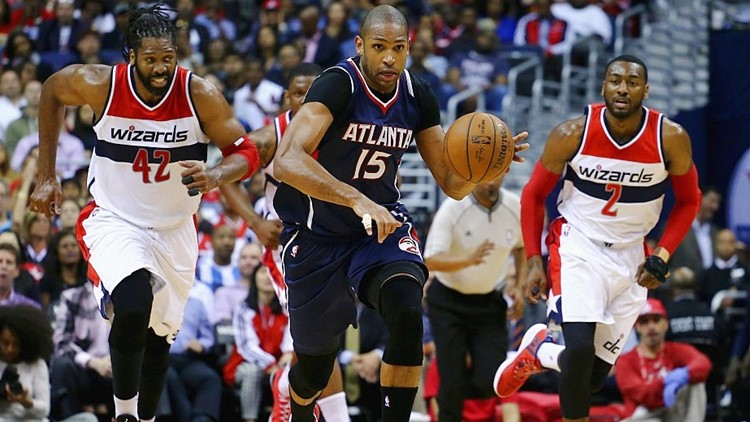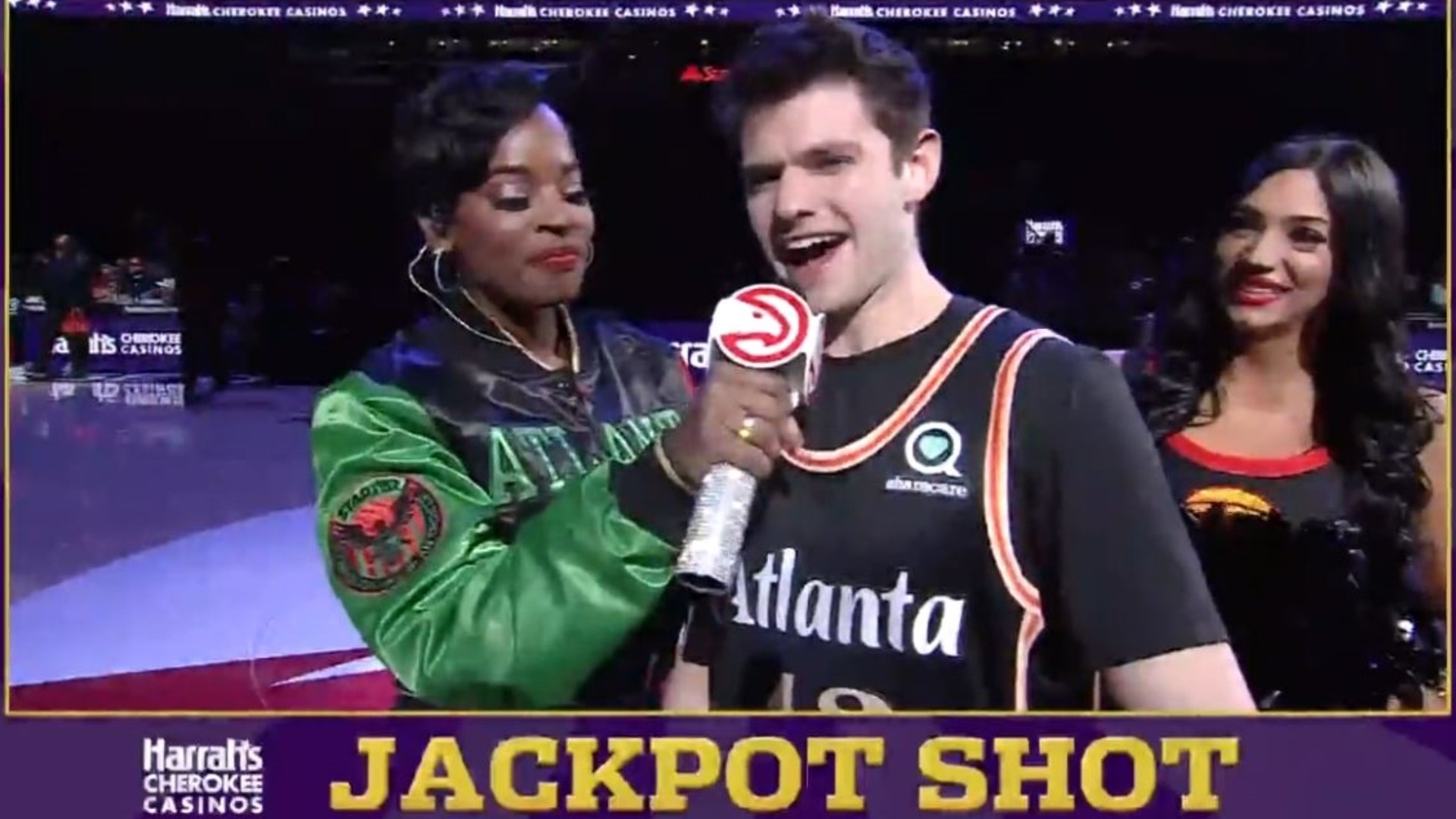ATLANTA—Well, tonight's the night.
In just a few hours, we'll know the status of the Hawks' highest of three first-round selections in next month's draft, courtesy of Tuesday's NBA Draft Lottery event.
(Atlanta also owns the 19th and 30th overall selections for Round 1.)
Here's a capsule preview of the TV-friendly drawing, along with a detailed look at some of the NBA's most infamous lottery occurrences from the last 33 years.
WHY WE HAVE A LOTTERY
On March 6, 1984, the Houston Rockets—sitting at 24-36—went into Operation: Shutdown mode, posting a 5-17 record in their final 22 games. That late swoon positioned the Rockets for a coin-flip matchup with the Portland Trail Blazers, as a means of determining which club would end up with the No. 1 pick. (Houston won the coin toss and snagged Hall of Famer Akeem Olajuwon.)
The fallout of the Rockets debacle prompted the NBA to adopt a lottery system for all non-playoff clubs, seemingly discouraging them from tanking down the stretch (the Philadelphia 76ers of 2013-17 would strongly disagree).
In the short term, this move also mollified the many team executives who loathed the Rockets for landing back-to-back top picks (1983/84) and drafting the Twin Towers tandem of Ralph Sampson and Olajuwon.
WHY SOME PEOPLE DON'T TRUST THE LOTTERY
Check out the YouTube video of former NBA commissioner David Stern pulling the seven envelopes from the inaugural lottery (1985); and then ponder the following questions floated out by the league's original band of draft doubters.
This day even has a time-tested nickname: "The Cold Envelope Conspiracy."
a) Why did Stern initially grab two envelopes when rooting through the pile?
b) Why would Stern even put himself into that untenable position of drawing the envelopes on national TV?
c) Was the whole process rigged?
d) Did the marketing-conscious NBA stand to benefit more from center Patrick Ewing—the no-brainer top choice in 1985—playing in New York City or Indianapolis? (Don't strain yourself too hard thinking about this one.)
In hindsight, the Wayman Tisdale or Benoit Benjamin eras would not have lasted in The Big Apple—compared to the Hall of Famer Ewing.
WHY WE NOW HAVE A WEIGHTED LOTTERY
The Orlando Magic claimed the No. 1 pick in 1992 and drafted Shaquille O'Neal ahead of Alonzo Mourning.
The following spring, after the Magic improved to 41 wins, the club had the slimmest of lottery odds—1.52 percent—but still landed the top choice, prompting justifiable outrage from NBA Nation.
Orlando converted the No. 1 pick (Chris Webber) into a draft-day trade package that brought Anfernee Hardaway (No. 3 overall pick) to central Florida, giving the young Magic a devastating inside-outside combo of O'Neal and Hardaway.
The Shaq-Penny union was destined to capture multiple titles, but that's not how things worked out: The Magic were swept by the Rockets in the 1995 NBA Finals; and the following summer, O'Neal signed with the Lakers as a free agent—something that likely wouldn't have happened under today's Collective Bargaining Agreement structure.
WHERE DO THE HAWKS STAND?
Heading into Tuesday's drawing, the Hawks have the fourth-best odds to win the No. 1 pick (13.7 percent), trailing the Suns (25 percent), Grizzlies (19.9 percent) and Mavericks (13.8 percent).
For the No. 2 slot, only Phoenix (21.5 percent) and Memphis (18.8 percent) have better statistical odds of landing that selection. Dallas and Atlanta share identical odds, at 14.2 percent.
A similar mathematical model applies to the No. 3 choice, with the Suns and Grizzlies holding slightly better odds, along with the Hawks and Mavericks each battling it out at 14.5 percent.
Now, here's where things get convoluted: Atlanta might own the fourth-greatest odds for getting the No. 1 pick, but the franchise only has an 8.5-percent chance at securing the fourth overall selection; and yet, the odds of the Hawks securing the fifth pick rise substantially to 32.3 percent ... before tailing off for No. 6 (15.5 percent) and No. 7 (1.3 percent).
In other words, a pessimistic Hawks fan has a great chance of their self-fulfilling prophecy coming true, if they are reasonably confident that Atlanta's number gets called at No. 5.
And with each prospective dip ... the Hawks move one step closer to drafting Oklahoma sharpshooter Trae Young in the lottery. He might not be everyone's cup of tea, when perusing the list of high-lottery possibilities, but there would be no denying Young's potential box-office appeal in Atlanta—especially with the Hawks ownership executing a big-time makeover of Philips Arena.
If Young ends up as a reasonable facsimile of Stephen Curry, then it would be an easy no-brainer for the Hawks outside the top five.
LOTTERY FUN FACTS: HAWKS EDITION
**The Hawks have never won the first overall pick in the modern-day lottery.
**Atlanta has not owned a lottery selection since 2007 (Al Horford).
HAWKS' TOP FIVE BEST LOTTERY PICKS
1. The aforementioned Horford in 2007 (No. 3 overall), a prospective Hall of Famer someday.
2. Guard Jason Terry in 1999 (No. 10 overall). Played at a strong level for 18 seasons. Averaged 16.2 points/5.5 assists during his time with the Hawks.
3. Power forward Pau Gasol in 2001 (No. 3 overall), even though the Hawks quickly traded the rights to Gasol for a package highlighted by veteran forward Shareef Abdur-Rahim.
4. Small forward Stacey Augmon in 1991 (No. 9 overall). In hindsight, the only other palatable option would have been Clemson power forward Dale Davis.
5. Point guard Rumeal Robinson in 1990 (10th overall). Another bad year of draft depth. Back then, not every NBA club happily pursued European stars, like Toni Kukoc (29th overall to the Bulls).
HAWKS' TOP THREE WORST LOTTERY SELECTIONS
1. Duke power forward Shelden Williams in 2006 (5th overall)
SKINNY: Atlanta's former management team unwisely tipped their hand on Williams before Draft Night; and yet, just minutes before the selection, a number of Hawks fans thought the club was bluffing on Williams—a solid defender and rebounder, but without the necessary upside of a top-five pick.
MISSED OPPORTUNITY: Rajon Rondo, Brandon Roy, Randy Foye, Rudy Gay, J.J. Redick, Kyle Lowry, Paul Millsap
2. North Carolina forward Marvin Williams in 2005 (2nd overall)
SKINNY: You never pass on a game-changing point guard, namely Chris Paul or even Deron Williams, when rebuilding a roster from scratch. It's one of the golden rules of drafting ... and yet, the Hawks' unrequited love for Marvin Williams (solid 12-year career; zero All-Star appearances) was too much to overcome.
MISSED OPPORTUNITY: Chris Paul, Deron Williams
3. SMU center Jon Koncak in 1985 (No. 5 overall)
SKINNY: Koncak was a contributing member of the gold-medal-winning U.S. Olympic team in 1984, starring Michael Jordan, Patrick Ewing and Chris Mullin; so it's easy to see how the Hawks got swept up in the Koncak hysteria on Draft Night 1985.
That aside, it was redoubtably a dud pick. Charting 11 pro seasons, Koncak merely averaged 4.5 points and 4.9 rebounds per game. Of equal infamy, the Hawks committed the unpardonable sin of matching the Detroit Pistons' mega-dollar offer sheet for Koncak in 1989 ... which placed the reserve center in the top-five salary scale at the time.
To this day, bitter NBA fans still refer to him as 'Jon Contract.'
MISSED OPPORTUNITY: Karl Malone, Joe Dumars, Chris Mullin, Detlef Schrempf, Charles Oakley, Terry Porter
THE ROYAL SCROOGIE
The Kings have had a lottery pick 18 times since 1992; but in that span, Sacramento has not wound up with a top-three selection.
The Kings have had only four only top-five picks in the last 26 years—Tyreke Evans (No. 4 overall in 2009), DeMarcus Cousins (No. 5 in 2010), Thomas Robinson (No. 5 in 2012) and DeAaron Fox (No 5. in 2017).
MAXIMIZING YOUR LOTTERY ENJOYMENT
In 1987, the Spurs took David Robinson No. 1 overall, despite The Admiral's two-year commitment with the United States Navy. In 1989, the club also landed Arizona's Sean Elliott (No. 3 overall).
Robinson and Elliott became the primary building blocks to one of the greatest turnarounds in NBA history, with San Antonio vaulting from 21 wins in 1989 to 56 victories in 1990.
Fast forward to 1997: With the Spurs coming off a so-so season, they lucked into the drafting of Wake Forest center Tim Duncan at No. 1 overall, even though the Celtics had better odds to grab the top spot.
Bottom line: Since 1985, the Spurs have made only three lottery appearances; and each time, the franchise has amazingly walked away with a top-three pick.
No other lottery franchise has done more with less.
BOOM-BOOM-BOOM
From 2005-14, the club with the worst record—from the Hawks (2005) to Milwaukee Bucks (2014)—failed to win the lottery.
Since 2005, a lottery team with a pre-drawing position of 6 or higher has won the No. 1 pick a staggering five times. In fact, during this stretch, the average lottery victor owned a pre-drawing slot of 5.6.
Now for the good news: From 2015-17, the NBA team with the worst record (Timberwolves, 76ers, Nets) won the rights to the No. 1 overall pick. However, this comes with a caveat, since Brooklyn had long ago traded that 2017 selection to Boston ... for a pair of older Celtics (Kevin Garnett, Paul Pierce) and a bag of magic beans.
THE MEMPHIS BLUES
The Cavaliers (17-65) secured the No. 1 pick in 2003 and wisely took LeBron James.
The Pistons, in turn, drew the No. 2 spot, the result of a 1997 trade with the Grizzlies.
If that lottery drawing had been transposed, with the Cavs getting the No. 2 choice, the Grizzlies—and not the Pistons—would have won the rights to LeBron because the pick was protected.
If the Grizzlies had corralled the No. 1 spot, the Otis Thorpe trade wouldn't have closed until the following season. In essence, Pistons fans were cheering for anything from Slots 2-6 ... with the hope of landing Darko Milicic, Carmelo Anthony or Dwyane Wade. (OK, so that decision didn't work out so well for Detroit.)
Back to the Grizzlies: It's fun to wonder how the LeBron era would have turned out for Memphis, for at least a seven-year window after being drafted?
Along those lines, would James have bolted for Cleveland or Miami as a free agent in 2010? Recent history would look demonstrably different today, if the Grizzlies hadn't experienced such bad luck.



